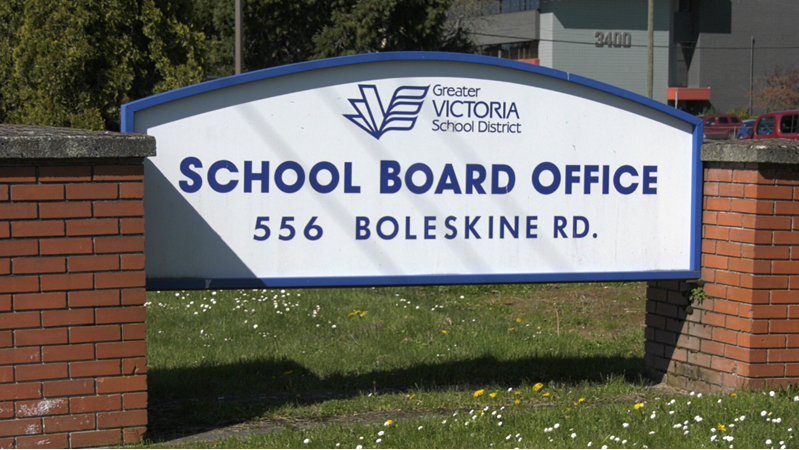Victoria school board votes to end police liaison program
 The Greater Victoria School District office is pictured: April 12, 2021 (CTV News)
The Greater Victoria School District office is pictured: April 12, 2021 (CTV News)
The Greater Victoria School District (SD61) board is following through with is controversial decision to end the school police liaison program.
Earlier this year, the Greater Victoria Teacher's Association brought forward concerns, saying that it believed school police liaison officers (SPLOs) had a negative effect on students, particularly Black, Indigenous, People of Colour (BIPOC), 2SLGBTQIA+, and people with disabilities.
The school board listened to these concerns and unanimously decided to end its SPLO program at a special board meeting Wednesday.
Other concerns raised by the school board included a lack of clear guidelines and oversite for SPLO activities in schools, and tasking police officers with issues they may not be trained for.
The school board approved three motions at its meeting Wednesday:
• To end its SPLO program while updating its policies around school emergencies – such as lockdowns – and asking superintendents to give SD61 a list of services that will no longer be offered by SPLO's, with recommendations on how to replace them.
• Urging the province to research the impacts of SPLO's on students.
• Asking that the province to fund community alternatives to SPLO's, like social workers, community coaches and restorative justice initiatives.
At the meeting, SD61 board chair Nicole Duncan said that she believed having professionals in mental health and substance use was a better alternative than having police officers provide guidance on these issues – saying that other professionals would not attempt to do a police officer's job, so police should not attempt to take on other professionals' roles.
HEATED DEBATE
The decision to end the program did not come without pushback.
Leading up to the vote Wednesday, local police leaders said it was important to have officers spend time at schools.
"This program is critical to the safety of youth in our community," said Victoria police Chief Del Manak after the Greater Victoria Teacher's Association first brought its concerns forward in March.
"This program also allows us to deal with worrisome behaviours that are not criminal, but are beyond the capacity of school teachers and counsellors to manage. That is the reality of what is happening in our local schools today," he said.
At the school board meeting Wednesday, Saanich police Chief Dean Duthie also voiced support for keeping SPLOs in schools, saying they helped teach students about bullying, bike safety, online safety and drug and alcohol use.
Officers could also intervene and help students "avoid what could result in criminal consequences" later down the line.
"I've been told time and time again that not only do students learn from us, but that we learn from them," said Duthie.
Meanwhile, a lack of research about the impacts of SPLOs in schools was considered by both sides of the argument.
The Greater Victoria Teacher's Association said that SPLOs should not be in schools until further research on their potential harms and benefits to students could be studied further, while Manak argued that the officers should not be removed, since it's unclear if potential harms outweigh the potential benefits.
The Victoria Principals' and Vice Principals' Association also voiced support for keeping SPLOs in schools, while the Support Network for Indigenous Women and Women of Colour argued that having police in schools had a negative impact on students.
"There have been many positive interactions through the SPLO program, but undeniably there are some students and staff who do not feel safe with police in schools," said Duncan in a statement Thursday.
"The decision to end the program speaks to the board’s commitment to provide trauma informed support and inclusive spaces for all students."
CTVNews.ca Top Stories

Spectacular aurora light show to be seen across Canada Friday night
A rare and severe solar storm is expected to bring spectacular displays of the northern lights, also known as aurora borealis, across much of Canada and parts of the United States on Friday night.
'Tactical evacuations' underway near Fort Nelson, B.C., as wildfires encroach
The BC Wildfire Service says 'tactical evacuations' began Friday near Fort Nelson, B.C., due to an out-of-control wildfire that has grown rapidly since it was discovered earlier in the afternoon.
Snowbirds in Vancouver for puck-drop flyby as Canucks face Oilers
The Canadian Forces Snowbirds will be performing a flyover across downtown Vancouver at the start of tonight's Stanley Cup playoff game between the Canucks and the Edmonton Oilers.
McGill University seeks emergency injunction to dismantle pro-Palestinian encampment
McGill University has filed a request for an injunction to have the pro-Palestinian encampment removed from its campus.
Which Canadian cities have the highest and lowest grocery prices?
Where you live plays a big factor in what you pay at the grocery store. And while it's no secret the same item may have a different price depending on the store, city or province, we wanted to see just how big the differences are, and why.
Swarm of 20,000 bees gather around woman’s car west of Toronto
A swarm of roughly 20,000 bees gathered around a woman’s car in the parking lot of Burlington Centre.
Video shows naked raccoon catching B.C. family by surprise
When Marvin Henschel spotted a strange and hairless creature wandering through a front lawn in B.C.'s Lower Mainland, he could barely believe his eyes.
Barron Trump declines to serve as an RNC delegate
Former U.S. President Donald Trump's youngest son, Barron Trump, has declined to serve as a delegate at this summer’s Republican National Convention, according to a senior Trump campaign adviser and a statement from Melania Trump's office.
Out-of-control wildfire prompts evacuation alert for Fort McMurray, Saprae Creek Estates Friday night
An evacuation alert was issued for two Wood Buffalo communities Friday night, as crews battled an out-of-control wildfire near Fort McMurray.
































